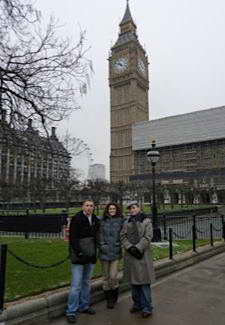Rob Schmidt, a Marist College political science major, spent his spring semester studying in London and working in the British Parliament as part of the Hansard Scholars Program. And, in an interview conducted before the British Parliamentary elections, Schmidt spoke with Political Communication and Politics student, Andrew Overton, about the results of the latest national Marist Poll focusing on the global perception of America, the differences between British and American politics, and his own experiences studying abroad. This interview was conducted as part of Overton’s senior year coursework. Read the interview below.
Andrew Overton
MIPO recently did a poll. According to the poll, 67% of U.S. residents said people in other countries generally have a negative view of the United States. Did you find that was the perception in London while you were living there, and do you have any stories that would maybe highlight the British perceptions of Americans?
Rob Schmidt
Well, I have to say I would agree with that and I would say that’s accurate. I did notice a difference though. If I was to tell people I was from the United States, I would get a much different reaction than if I told someone I was from New York. Telling people I was from New York often generated a better response. I guess New York kind of they have a different mentality towards all types of Americans. I can’t really think of a specific instance, but I still — I get the impression that we have this sense of arrogance and even a sense of almost laziness in terms of just pretty much all aspects of life. The thing obviously now that was the big talk was the health care debate. With everything going on, everyone would ask us: “What’s the matter with you guys? Why haven’t you hopped on board to socialized medicine? It just makes no sense.” And, that was pretty much what sparked conversation when I would tell people where I was from.
Andrew Overton
Interesting. 57% of U.S. residents said in this poll that what we have in common with people who live in England is greater than how we are different. What are your thoughts on that, and what were some surprising similarities you found, and what were some of the biggest difference you found?
Rob Schmidt
Well, I definitely think we have a lot in common, obviously being arguably the two biggest and most successful democracies in the world. In terms of technology, over in London, everyone was glued to their Blackberries either on Facebook, Twitter, reading some type of — reading something, playing some kind of game. Just that kind of engagement in technology was quite similar. The thing I noticed though that was different in terms of reading the news and stuff was that everyone in Britain reads a newspaper. There’s a free newspaper that comes out in the morning and a free one in the evening. When I would be riding the subway to work in the morning, you could almost hear a pin drop, because everyone is sitting down reading their paper, and I would say that’s much different here in the United States. People often are going to the new media, the Internet, and the blogs and stuff for their information. Where that is very popular in the U.K. as well, but definitely in the U.K. that the newspaper industry is still a staple over there.
Andrew Overton
12% of U.S. residents said that the U.S. is the world’s only superpower. Do you think these numbers echo the beliefs of Europeans, and why or why not?
Rob Schmidt
Well, I really didn’t engage in any conservation with anyone in the U.K. about America’s power, world power, but I did get the sense of when I was in London, even though there were different cultural — there were cultural differences, I still felt that London was very Americanized. Or I shouldn’t say Americanized, but it was like America. I did feel like … I did feel very safe and I felt that everything was kind of in sync with the American way of life. I don’t know if that makes Britain kind of equal to a world superpower in — on the United States’ level, but I do think that … oh I should say, I am surprised that only 12% of U.S. residents thought that.
Andrew Overton
How does British politics differ from, say, the U.S. party system?
Rob Schmidt
Oh well right off the bat, I’m sure you know this from doing the Hansard Program as well, every Wednesday they have the PMQs, Prime Minister’s Questions, where Gordon Brown, the current Prime Minister, goes into the Chambers of Parliament and different members of Parliament are able to ask some questions about anything, any type of policy, anything that’s going on. And to be honest, I think America could take that one-hour time interval and put it on Fox, and I think it would get more ratings than “American Idol.” It’s so entertaining. And I think that’s the biggest difference in British politics is that there’s much, from what I saw, much more deliberation among members. I just have a hard time seeing President Obama or even President Bush going down into Congress on Capitol Hill and just getting raided with questions. I mean presidents have enough trouble dealing with scheduled press conferences and staged press conferences and our current members of Congress have a problem even putting on the debates in the Senate and the House on CSPAN, and I think that’s much different in Britain. I think the policies and the politics are much more open to the public. If the public utilizes these resources, I’m not sure if they totally use it to their advantage though.
Andrew Overton
There is a U.K. general election in less than three weeks [on May 6th]. Well it’s two weeks now probably.
Rob Schmidt
Yeah.
Andrew Overton
What is the political climate like there, and do you have any predictions?
Rob Schmidt
Well, when I was there, the Conservative Party was thought to have — was going wipe out Labour this election. Best case scenario for the Conservatives when I was there was that it was going to be a hung Parliament with the Conservatives in the minority, but without Gordon Brown having a mandate to run the country. So, best case scenario was that Cameron and Brown would lead a coalition government, and hopefully, Cameron would eventually either hold another election, or Parliament would file a No Confidence Act against Brown. But, now very recently, I think things are changing. Just … I’m obviously not as engaged in politics as I was — British politics as I was, but I did catch a little bit of the first ever debate held by the three members — Nick Clegg of the Lib Dems, Cameron of the Tories, and Brown of the Labour — and from what I heard and saw, Nick Clegg did very, very well in the debate and that has shifted a lot of the momentum towards the Liberal Democrats and taken it away from the Conservatives and from the Labour. I would still say right now, if I was to make a prediction, that the Conservatives will do well in the election, much — or I think they will do better than the Labour, but I think the third party Liberal Democrats will take some of that away from them; and with this recent thing, I think it makes everything so much more confusing. But that sentiment of big government and failure of — failure to the public, too much spending, I would still safely say is still there, and I think that there’s going to be a lot happening over the next two to three weeks.
Andrew Overton
All right, well thank you so much, Rob. Appreciate your time. I know you’re working hard.
Rob Schmidt
Yeah, and actually I just have another minute. There’s just one other thing I wanted to comment on …
Andrew Overton
Go for it.
Rob Schmidt
… in terms of Hansard. I actually… I had a… With everything with the health care debate going on, I did have a firsthand experience with the National Health Service, the government health care in the U.K. I actually wound up being in the hospital for three days. I came down with an intestinal infection and had to unfortunately be sent home a bit early. But in terms of care, I thought that the care was good. The hospital that I was in was quite comparable to one in the United States. And, I did wait a little while in the emergency room, but that’s not much different than anything here. I was sent home with a diagnosis, and I came home, and I was treated for something else. And, I actually wound up getting much better here in the States. I’m not saying that I was totally misdiagnosed in the U.K., but I think that in the U.K., they were a little bit more pressed for time. I don’t know if it was just my situation, but I didn’t … although the care was good, I didn’t seem to get as much attention from the doctors as I did over here. Like I said, whether that’s due to my time constraints when I was in the U.K., but I think it cleared up some things for me in terms of the care of the nurses and things like that, and I think now that the issue that I have with the whole idea of a “socialized medicine” isn’t the fact of the treatment, it’s the fact of the cost because I luckily didn’t pay a penny for those three days in the hospital. But somebody, some farmer probably in Northern England, is footing my bill. Whether that’s justifiable or not is I think the key component for the debate here going on in America.


